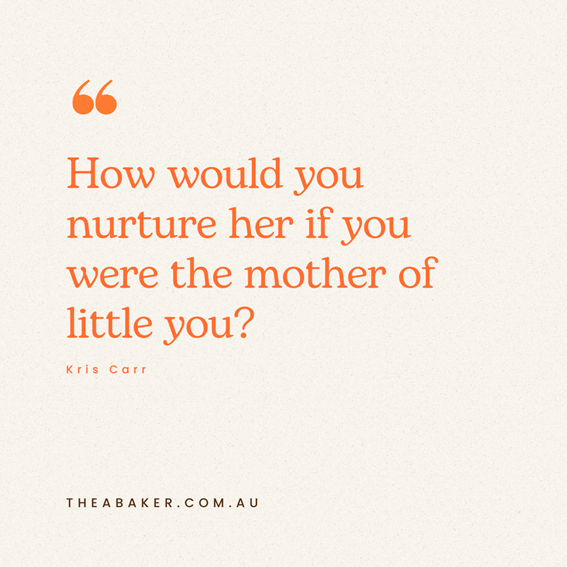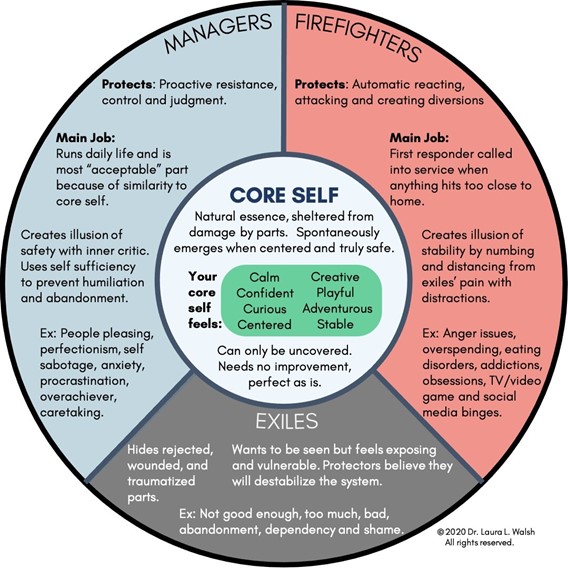Knowing your SELF
Knowing your SELF
I’ve written about concept of ‘parts of self’ and more broadly an appreciation that we have multiple ‘parts’ of us which might help us better understand what might appear to be contradictory feelings, beliefs or reactions to people / events around us. If you missed that blog, go back and read it HERE – it’s a good summary that might be useful to read before getting too far into this one.

I’ve shared before my own experiences of unpacking some of my parts, including my ten-year-old part who was really sad and homesick. There’s the part that carries the attachment trauma wound, feels that pain (rejection and abandonment) keenly and carries a negative belief around being unlovable and not good enough (otherwise why would she be sent away?). And around the same age I have a super protective part who came along to manage all that hurt, and to make sure that other people didn’t see how homesick I was. She has done an excellent job of a number of really adaptive things. She’s the part that I credit with navigating tricky times in my life independently, the part that thought that moving to Australia from the UK with two children under five was a totally realistic prospect, and she’s probably played a part in some of my career choices, for example setting up a private practice on my own. She is tricky though because she can keep people at arm’s length and can make maintaining friendships harder than it probably needs to be and probably (definitely) makes me hard work in relationships! Working with her is a bit of an ongoing process – she the part of me that encompasses what I consider to be one of my strengths, even though she evolved from a trauma-time (as all our manager/protector parts do) and I have to keep her in check (often!).
Often (but not always) the parts that carry our trauma are young parts – that is they were young when the trauma occurred and for a variety of reasons, they get stuck at that age bearing the weight, pain and beliefs that come with the trauma. Our protective parts start off little too – but I’ve been reflecting lately how as we age, grow and experience all the ups and downs that our lives throw our way that it’s actually really very important to realise that we collect new parts along the way. Even at the most simplistic level one way to think about this is even as we maybe become a partner, parent, or transition to a new job they all will likely see some new evolution of our parts. With each new identity or experience there’s the potential for new parts to show up – parts that aren’t necessarily our SELF. And we need to hang out with them, get to know them and see what they might need us to work through so that we can be an integrated whole person.

We all have various different ‘parts’ but it doesn’t mean we have different ‘selves’, nor do we have multiple personalities. Knowing our parts and understanding how to work with them allows us to uncover beautiful aspects of ourselves as well as healing old trauma wounds. Working with the framework developed by Richard (Dick) Schwartz known as Internal Family Systems (IFS) is one of the most helpful ways that I’ve found for people to connect to, heal and work with parts of self. According to Dick, we might imagine that we have three categories of parts:
- Exiles – usually our younger parts that hold deep emotions, vulnerabilities and who have needs memories that went ignored, unmet or unresolved. They carry our trauma but are not our trauma. They have been exiled only because there has never been space for them to have their hurts processed.
- Managers – these are the parts that keep us functioning in the world. They are the parts that I imagine we’d talk about at a job interview – being organised or perfectionistic. These parts are responsible for managing (controlling) people, spaces, and places to make sure we’re safe enough and to ensure those wounded exiles aren’t being seen in the world.
- Firefighters – these ones are the back-up protective parts that step in when our manager parts have been overwhelmed or have dropped the ball. They are pretty impulsive, and their primary focus is to engage from a place of desperation to get the pain to go away. Examples of firefighter parts are addictive behaviours, disordered eating behaviours, dissociation, or self-harm.
These parts are all different from what we might call our true ‘self’ or ‘adult self’ – Dick calls this our ‘Self with a capital S’. Ultimately our goal is to operate as much of the time from our place of self…but I think when we think or talk about ourselves, we are more often than not coming from one of our manager parts. And often those managers are pretty tired because they’ve been doing their management roles for a really long time.
Because I’m still on the come-down from The Era’s Tour (Taylor Swift for all you non-Swifties) – watch this video of her song Anti-Hero – I think it illustrates what it’s like to have some parts that are a little bit wild! (Click HERE to view that).
If you’d like to explore your SELF and would like a safe space to talk about how they may impact your mental health, please get in touch with us: www.theabaker.com.au / hello@theabaker.com.au / 03 9077 8194.
